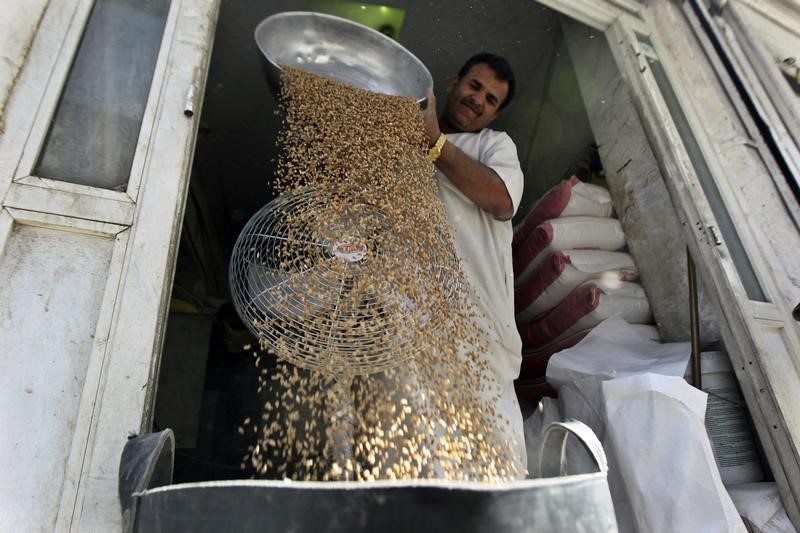* Ergot fungus takes centre stage as row over levels persist
* Quarantine agency sticks to zero tolerance law
* Threat of rejected shipments has kept suppliers away from Egypt
By Eric Knecht and Maha El Dahan
CAIRO/ABU DHABI March 2 (Reuters) - A global grain glut should make purchasing wheat cheap and easy for Egypt, the world's biggest importer, but traders say one bureaucrat has made it anything but.
Saad Moussa, the head of the agricultural quarantine agency, refuses to let in a single grain of wheat infected with ergot, a common fungus that can lead to hallucinations and irrational behaviour in large quantities but at trace levels is of no harm to humans.
Confusion over Egypt's position on ergot levels has disrupted wheat tenders, raising the possibility of a shortage of grain which could pose a political problem for President Abdel Fattah al-Sisi as the impoverished population relies on highly subsidised bread.
Officials at Moussa's quarantine authority use a 2001 regulation, which Reuters has seen, stipulating zero tolerance for ergot as their main guide, according to a quarantine official who declined to be named. They first used the rule to reject a wheat shipment in December.
Moussa, who did not respond to repeated attempts to contact him for this story, told Reuters in January: "Any wheat that we inspect that has any level of ergot will be rejected...it would be very harmful if any level of contamination reached plants in Egypt."
Moussa reports to Agriculture Minister Essam Fayed but a spokesman for the agriculture ministry said he had no knowledge of the 2001 regulation Moussa was relying on.
"I don't know anything about this topic, the last thing I have is what was announced by the agriculture minister and the minister of supply that they would accept 0.05 percent," spokesman Eid Hawash said.
Officials at the Supply Ministry were not available for comment for this story.
Most Egyptian officials follow a different specification issued in 2010 by the Egyptian Organization for Standardization and Quality allowing trace levels of 0.05 percent, the common worldwide standard and the one stipulated by Egypt's grain-importing body, the General Authority for Supply Commodities (GASC).
"I am bound by the Egyptian specifications," Mamdouh Abdel Fattah, vice chairman of GASC, told Reuters when asked about the contradiction between the two, stressing that the 2010 specifications are more recent than the 2001 regulation and is accepted internationally.
TWO DECISION MAKERS
Panic began to spread among traders after a 63,000-tonne French wheat shipment purchased by GASC was rejected by the quarantine agency in December for containing trace levels of ergot.
GASC was forced to cancel two tenders after rattled traders and suppliers stayed away, uncertain that their shipments would be ergot free and fearing the heavy cost of having a shipment rejected.
After weeks of confusion Minister Fayed and Supply Minister Khaled Hanafi tried to reassure the market in a joint press conference on February 7 that Egypt would accept all shipments with less than 0.05 percent ergot.
The following day Moussa's agency rejected a shipment of Canadian wheat, further baffling the market
"This was a big surprise. It was one day after the TV announcement of both ministers...and all of a sudden the vessel is rejected. So do we have two different decision makers in the same (agriculture) ministry?" the Cairo-based trader said.
According to documents seen by Reuters, the shipment had a far lower ergot reading than 0.05 percent.
The lack of successful sales prospects to a huge buyer along with record global wheat supplies has weighed on Benchmark global grain prices and curbed export prospects for European Union producers. ID:nL8N1611D1
That should have created ideal conditions for Egypt to buy wheat at great prices.
INCALCULABLE RISK
GASC successfully purchased 300,000 tonnes of wheat last week. But with less than half the usual number of suppliers opting to make bids during the tender, the uncertainty was still front and centre. ID:nL8N1643V8
"The risk is still incalculable," said a Cairo-based trader that sat out of the tender, echoing the sentiment of several others reached by Reuters.
All traders interviewed for this story asked to remain anonymous. Wheat traders are generally banned from speaking to the media by the companies they represent.
Traders who sat out the latest tender said they would remain on the sidelines, at least for now.
"(Moussa's) definitely not changed his mind at all -- he's even lobbying all the research centres in the country and now they are all convinced with the zero," said another trader.
Egypt will announce the results of its latest tender for an unspecified amount of wheat from global suppliers for shipment from April 5-14 after 3:30 p.m. local time (1330 GMT) on Wednesday.
Hanafi said on Friday Egypt has enough wheat supplies to last until the middle of June. But should the crisis deepen, it could hurt Sisi's credibility at a time of waning popularity and with the economy struggling after years of political turmoil.
The former army chief faced tough criticism last week by Egyptians on social media after he delivered a long television speech on his vision for the future.
Any Egyptian leader knows ample supplies of low-cost bread are key to maintaining stability.
President Anwar Sadat triggered riots when he cut the bread subsidy in 1977. And when Egyptians rose up against autocrat Hosni Mubarak's rule in 2011, one of their signature chants was "Bread, freedom and social justice". (Editing by Michael Georgy and Anna Willard)
